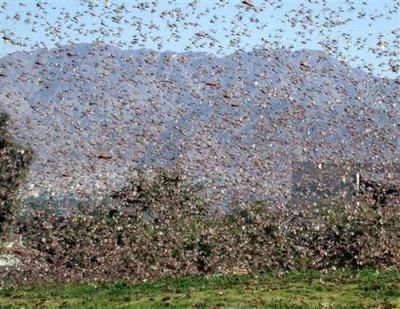Tasnim – While the world continues to fights to slow the spread of COVID-19, countries in South and Southwest Asia are simultaneously responding to plagues of pests that threaten to worsen hunger and the livelihoods of millions of people, FAO warned.
Swarms of Desert Locust, over the last couple of months, have moved swiftly into west Asia attacking vegetation in parts of Iran and Pakistan, and are now threatening crops in India. These swarms are the worst experienced in more than a generation.
Fall armyworm, a maize-destroying pest that migrated to Asia from Africa in 2018, has also spread across the continent and has arrived in Australia.
While the lockdowns of countries across the Asia-Pacific Region in response to COVID-19 have taken their toll on the economies, lives and livelihoods of millions of people, the convergence of these plant pests will only add to the suffering.
“We cannot and must not under-estimate the damage to lives and livelihoods that the convergence of these crises will have on food security and hunger in this part of the world, already home to most of its undernourished people,” said Jong-Jin Kim, FAO Deputy Regional Representative and Head of the FAO Regional Office for Asia and the Pacific. “While we continue the battle to save lives and contain the spread of COVID-19, we must now fight a war that has multiple fronts and various enemies here in the Asia-Pacific region,” Kim added.
Desert Locusts can devour huge amounts of vegetation, including wild plants, trees and grasslands, but they also attack vegetable crops and fruit trees.
A single swarm of Desert Locust can cover an entire square kilometer and contain some 80 million insects. FAO experts estimate the number of locusts could grow twenty-fold in the upcoming rainy season in South Asia unless extra measures to counter the swarms are put in place. FAO is tracking the movements across Africa, Asia and the Middle East.
In many countries affected by Fall armyworm (FAW), COVID-19 lockdowns have resulted in pest management activities being reduced or ceased entirely. FAO has published a guidance note for responding to outbreaks of FAW during the simultaneous challenges faced by countries’ responses to COVID-19.
Farmers need significant support to manage FAW sustainably in their cropping systems through Integrated Pest Management (IPM) activities. FAO has launched a Global Action for FAW Control as a response to the international threat that FAW is posing for food security and the livelihoods of millions of smallholder farmers.
“FAO continues to support our member countries in response to these and other threats in these very challenging times,” said Kim. “Together we’ll get through this, for our own sake, and for the sake of future generations.”






